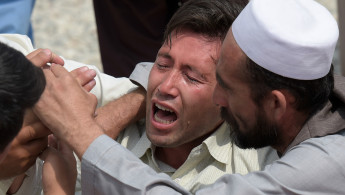Day of mourning in Afghanistan after deadly 'war crime'
Day of mourning in Afghanistan after deadly 'war crime'
Funerals begin in western Kabul as families collected their dead from hospitals and morgues across the capital after a suicide attack claimed by the Islamic State group killed scores.
2 min read
Funerals were due to begin quietly in western Kabul as families collected their dead [Getty]
Afghanistan marked a national day of mourning on Sunday, a day after at least 80 people were killed by a suicide attack on a peaceful demonstration, claimed by the Islamic State group.
Funerals were due to begin quietly in western Kabul as families collected their dead from hospitals and morgues across the capital.
United Nations Special Representative to Afghanistan Tadamichi Yamamoto branded the attack a war crime.
"An attack deliberately targeting a large, concentrated group of civilians amounts to a war crime” Yamamoto said in a statement.
"It is an attempt to spread terror amongst civilians and stifle the freedoms that Afghans have sacrificed so much to obtain."
Authorities say another 231 people were wounded, some seriously, in the attack Saturday afternoon on a march by members of the ethnic Hazara community, who are predominantly Shia Muslim.
Most Afghans are Sunni, and the IS group regards Shias as apostates.
The IS group has had a presence in Afghanistan for the past year, mainly in the eastern province of Nangarhar along the Pakistani border.
The Afghan military, backed by US troops, is planning an offensive against IS positions in Nangarhar in coming days.
Prior to the Saturday attack, thousands of Hazaras had marched through Kabul to demand the re-routing of a power line through their impoverished province of Bamiyan, in the central highlands.
It was their second demonstration; the first was in May and had a much better turnout and was attended by senior Hazara politicians who were absent from Saturday's march.
The office of President Ashraf Ghani said that march organisers had been warned to call off the demonstration after intelligence was received that an attack was likely.
Daud Naji, a member of the Enlighten Movement which organised the marches said on Sunday that they had been told only that there was a "heightened risk" of attack and had subsequently cancelled nine of 10 planned routes.
He said that despite a government ban on all public gatherings and demonstrations for 10 days following the attack, the funerals and mourning would go ahead.



